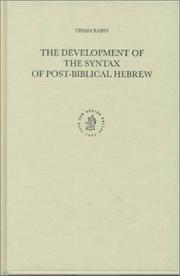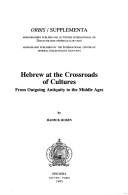| Listing 1 - 10 of 17 | << page >> |
Sort by
|
Book
ISBN: 9789004472808 9789004472792 Year: 2021 Publisher: Leiden; Boston : Brill
Abstract | Keywords | Export | Availability | Bookmark
 Loading...
Loading...Choose an application
- Reference Manager
- EndNote
- RefWorks (Direct export to RefWorks)
This volume is both a continuation of the four already published titles in the series (2011-19) and an addition to the Concise Dictionary of Novel Medical and General Hebrew Terminology from the Middle Ages . It continues mapping the medical terminology featured in medieval Hebrew medical works in order to facilitate study of medical terms that do not appear in the existing dictionaries, as well as identifying the medical terminology used by specific authors and translators in order to identify anonymous medical material. The terminology discussed in this volume has been derived from fourteen different sources, including translations of Ibn al-Jazzār's Zād al-musāfir by Moses ibn Tibbon ( Sefer Ṣedat ha-Derakhim ) and the otherwise unknown Abraham ben Isaac ( Sefer Ṣedah la-Oreḥim ), as well as the translation of Constantine the Africanʼs Latin version ( Viaticum ) prepared by Do'eg ha-Edomi ( Sefer Yaʾir Netiv ).
Book
Year: 2022 Publisher: Cambridge : Open Book Publishers,
Abstract | Keywords | Export | Availability | Bookmark
 Loading...
Loading...Choose an application
- Reference Manager
- EndNote
- RefWorks (Direct export to RefWorks)
"This groundbreaking new work is the first full critical edition and English translation of the Hebrew book Sefer ha-Pardes [The Book of the Orchard], written at the end of the thirteenth century by the Provençal Jewish author Jedaiah ha-Penini. It is purportedly an example of musar: a compilation of wise epigrams and meshalim [parables] that teach moral lessons on different topics, such as the service of God, friendship, the deceitfulness of the world, medicine, logic, music, magic, and poetry. However, it is in reality a compendium of sayings that reveal the author's personal views and feelings on a variety of religious topics, secular sciences, and their practitioners. David Torollo presents a fluent and illuminating English-Hebrew parallel text based on four sixteenth-century witnesses: three manuscripts and a printed edition. A rigorous study accompanies and contextualises the Hebrew work, exploring Sefer ha-Pardes's transmission and reception in different places over time; its structure and content; its place in the intellectual environment and literary tradition of Provence; and possible lines of enquiry for future research. This essential new work offers a significant contribution to scholarship in the field of Medieval Hebrew Hispano-Provencal literature."--Publisher's website.
Book
Year: 2022 Publisher: Cambridge : Open Book Publishers,
Abstract | Keywords | Export | Availability | Bookmark
 Loading...
Loading...Choose an application
- Reference Manager
- EndNote
- RefWorks (Direct export to RefWorks)
"This groundbreaking new work is the first full critical edition and English translation of the Hebrew book Sefer ha-Pardes [The Book of the Orchard], written at the end of the thirteenth century by the Provençal Jewish author Jedaiah ha-Penini. It is purportedly an example of musar: a compilation of wise epigrams and meshalim [parables] that teach moral lessons on different topics, such as the service of God, friendship, the deceitfulness of the world, medicine, logic, music, magic, and poetry. However, it is in reality a compendium of sayings that reveal the author's personal views and feelings on a variety of religious topics, secular sciences, and their practitioners. David Torollo presents a fluent and illuminating English-Hebrew parallel text based on four sixteenth-century witnesses: three manuscripts and a printed edition. A rigorous study accompanies and contextualises the Hebrew work, exploring Sefer ha-Pardes's transmission and reception in different places over time; its structure and content; its place in the intellectual environment and literary tradition of Provence; and possible lines of enquiry for future research. This essential new work offers a significant contribution to scholarship in the field of Medieval Hebrew Hispano-Provencal literature."--Publisher's website.

ISBN: 9004114335 9004348484 9789004348486 9789004114333 Year: 2000 Publisher: Leiden Boston Brill
Abstract | Keywords | Export | Availability | Bookmark
 Loading...
Loading...Choose an application
- Reference Manager
- EndNote
- RefWorks (Direct export to RefWorks)
This volume is concerned with a historical development of the syntax of Hebrew in the post-biblical periods, more specifically from the twelfth to the fifteenth centuries as used in non-artistic prose in Southern France and Spain, a period in which the language underwent some fundamental changes and developments. With his superb knowledge of all phases of Hebrew the author portrays and analyses these developments in relation to Biblical and Mishnaic Hebrew. This is a highly original and important contribution to a diachronic description of Hebrew syntax, and undoubtedly a necessary reading for any serious Hebraist and Semitist.
Book
ISBN: 9004382623 9789004382626 9789004382619 9004382615 Year: 2019 Publisher: Leiden Boston
Abstract | Keywords | Export | Availability | Bookmark
 Loading...
Loading...Choose an application
- Reference Manager
- EndNote
- RefWorks (Direct export to RefWorks)
This volume is part of a wider project aiming at mapping the technical medical terminology as it features in medieval Hebrew medical works, especially those terms that do not feature in the current dictionaries at all, or insufficiently. In this way the author hopes to facilitate the consultation of these and other medical works and the identification of anonymous medical material. The terminology discussed in this volume has been derived from three primary and seven secondary sources. The primary sources are: (1) Sefer Ṣedat ha-Derakhim – Moses Ibn Tibbon’s translation of Ibn al-Jazzār’s Zād al-musāfir , bks. 1–2; (2) Sefer ha-Shimmush – Shem Tov Ben Isaac’s Hebrew translation of al-Zahrāwī’s Kitāb al-taṣrīf ; (3) Sefer ha-Qanun – Nathan ha-Meʾati’s Hebrew translation of the first book of Ibn Sīnā’s K. al-Qānūn .
Medicine --- Hebrew language, Medieval --- Hebrew language --- Terminology. --- Technical Hebrew --- History
Book
Abstract | Keywords | Export | Availability | Bookmark
 Loading...
Loading...Choose an application
- Reference Manager
- EndNote
- RefWorks (Direct export to RefWorks)
Book
ISBN: 9004534423 Year: 2023 Publisher: BRILL
Abstract | Keywords | Export | Availability | Bookmark
 Loading...
Loading...Choose an application
- Reference Manager
- EndNote
- RefWorks (Direct export to RefWorks)
"This volume is both a continuation of the five already published titles in the series (2011-2021) and an addition to the Concise Dictionary of Novel Medical and General Hebrew Terminology from the Middle Ages. It continues mapping the medical terminology featured in medieval Hebrew medical works in order to facilitate study of medical terms that do not appear in the existing dictionaries as well as identifying the medical terminology used by specific authors and translators in order to identify anonymous medical material. The terminology discussed in this volume has been derived from fourteen different sources, including translations of Ibn al-Jazzar's Zad al-musafir by Moses ibn Tibbon (Sefer ¿edat ha-Derakhim) and the otherwise unknown Abraham ben Isaac (Sefer ¿edah la-Ore¿im), as well as the translation of Constantine the African's Latin version (Viaticum) prepared by Do'eg ha-Edomi (Sefer Ya¿ir Netiv)"--
Medicine, Medieval --- Hebrew language --- Hebrew language, Medieval --- Jews --- Hebrew. --- English. --- Medicine --- History
Book
ISBN: 9789654938648 9654938642 Year: 2016 Publisher: Yerushalayim Hotsaʼat sefarim ʻa. sh. Y.L. Magnes, ha- Universiṭah ha-ʻIvrit
Abstract | Keywords | Export | Availability | Bookmark
 Loading...
Loading...Choose an application
- Reference Manager
- EndNote
- RefWorks (Direct export to RefWorks)
Hebrew language --- Hebrew language, Medieval --- Hebrew language --- History --- Study and teaching --- History
Book
ISBN: 9004439013 9004461221 Year: 2021 Publisher: Brill
Abstract | Keywords | Export | Availability | Bookmark
 Loading...
Loading...Choose an application
- Reference Manager
- EndNote
- RefWorks (Direct export to RefWorks)
Translating the Hebrew Bible in Medieval Iberia provides the princeps diplomatic edition and a comprehensive study of Oxford, Bodleian Library, MS Hunt. 268. The manuscript, produced in the Iberian Peninsula in the late thirteenth century, features a biblical glossary-commentary in Hebrew that includes 2,018 glosses in the vernacular and 156 in Arabic, and to date is the only manuscript of these characteristics known to have been produced in this region. Esperanza Alfonso has edited the text and presents here a study of it, examining its pedagogical function, its sources, its exegetical content, and its extraordinary value for the study of biblical translation in the Iberian Peninsula and in the Sephardic Diaspora. Javier del Barco provides a detailed linguistic study and a glossary of the corpus of vernacular glosses.
Arabic language --- Spanish language --- Castilian language --- Romance languages --- Semitic languages --- Hebrew language, Medieval --- Foreign words and phrases --- Spanish --- Arabic --- Bodleian Library. --- Medieval Hebrew language

ISBN: 9068316850 2877232727 Year: 1995 Volume: 3 Publisher: Leuven Peeters
Abstract | Keywords | Export | Availability | Bookmark
 Loading...
Loading...Choose an application
- Reference Manager
- EndNote
- RefWorks (Direct export to RefWorks)
Historical linguistics --- Hebrew language --- anno 500-1499 --- Hebreeuws --- Hébreu (langue) --- Letterkunde, Hebreeuwse --- Littérature hébraïque --- Hebrew language, Post-Biblical. --- Hebrew language, Medieval. --- Jews --- Languages --- History. --- Hebrew language, Medieval --- Hebrew language, Post-Biblical --- Hebrews --- Israelites --- Jewish people --- Jewry --- Judaic people --- Judaists --- Post-Biblical Hebrew language --- Medieval Hebrew language --- Languages&delete& --- History --- Ethnology --- Religious adherents --- Semites --- Judaism
| Listing 1 - 10 of 17 | << page >> |
Sort by
|

 Search
Search Feedback
Feedback About UniCat
About UniCat  Help
Help News
News